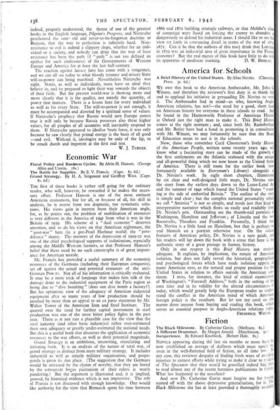America for_ Schools
A Brief History of the United States. By Allan Nevins. (Clarendot Press. 3s. 6d.)
WE owe this book to the American Ambassador, Mr. John Cl Winant, and therefore the reviewer's first duty is to thank him and to applaud his initiative in persuading Dr. Nevins to write it. The Ambassador had in mind—as who, knowing Anglo. American relations, has not?—the need for a good, short book on American history for everyone in these islands to read. And he found in the Harmsworth Professor of American History at Oxford just the .right man to make it. This Brief History comes at the right moment ; and, since both Mr. Ramsbothan and Mr. Butler have had a hand in promoting it in consultatioo with Mr. Winant, we may fortunately be sure that the Board Of Education mean to use it in the schools.
Now, those who remember Cecil Chesterton's lively History of the American People, written some twenty years ago, will know what a fascinating story can be made of the growth oi the first settlements on the Atlantic seaboard with the unique and all-powerful thing which we now know as the United State of America. There is still room for the earlier book (now fortunately available in Everyman's Library) alongside of Dr. Nevins's. work. In eight short chapters, . illuminated by six clear and well-designed little maps, Dr. Nevins takes the story from the earliest days down to the Lease-Lend Act and the summer of 1941 which found the United States " stand- ing at the side of embattled Britain." The outline of the story is simple and clear ; but the complex national personality which we call " America " is not so simple, and needs just that kind of interpretative narrative which flows so easily and readably from Dr. Nevins's pen. Outstanding are the thumb-nail portraits of Washington, Hamilton and Jefferson ; of Lincoln and the two ROosevelts, Theodore and Franklin. Personally, I think that Dr. Nevins is a little hard on Hamilton, but that is perhaps no real blemish on a portrait otherwise true. On the salient features of American policy, Dr. Nevins is a sure guide, and his readers will lay down the book with a sense that here is the authentic story of a great passage in human history. Only in one respect is this Brief History not entirely adequate. It explains, by implication, the nature of American isolation, but does not fully reveal the historical, geographical and psychological forces which have made isolation appear, in many American eyes, as the natural and proper position for the United States in relation to affairs outside the American con- tinent. I miss, for instance, the kind of critical examination of Washington's " Farewell Address," both in the setting of his own time and in its validity for the altered circumstances of today, which would greatly help the European reader to under- stand the conflict in the American mind of which American foreign pOlicy is the resultant. But let not my cavil on this matter deter anyone from buying and reading this book, which serves an essential purpose in Anglo-American relations today.
- FREDERICK WHYTE.


























 Previous page
Previous page